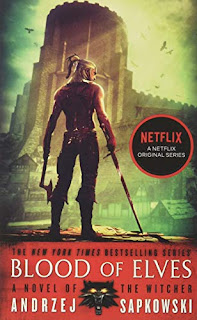The Meat
I reviewed the first witcher book, The Last Wish, not too long ago. Suffice to say, I really, really liked it. The characters were memorable, the prose was far more sophisticated than in most fantasy, and the world Sapokowski created was deeply compelling. I loved almost everything about it, from the sharp dialogue to the complex and multifaceted treatments of racism, sexism, colonialism and other socio-political issues that affect us in the real world. And I particularly appreciated the way the book managed to operate simultaneously as serious fantasy and as a tongue-in-cheek deconstruction of genre's tropes and cliches. All of that returns, and is explored in greater detail, with Blood of Elves, the first of a five novel witcher sequence published by Orbit.
Action starts in the wake of a failed Nilfgaardian invasion of the northern kingdoms. Though turned back at the Battle of Sodden, Nilfgaard has managed to conquer the southern Kingdom of Cintra, as well as several of its neighbors. Unfortunately for the Emperor and his cronies, the princess Ciri has escaped. Geralt, who the girl was promised to in the short story "A Question of Price" (from The Last Wish), finds her and brings her to the castle Kaer Morhen, where he begins training her as a witcher. As the book unfolds, it becomes clear that there's much more to this girl than meets the eye, though it isn't exactly clear what--even the by end of the book. Nevertheless, many important people are interested in her, from the Emperor of Nilfgaard and his wizard crony Rience, to the various kings of the North.
The book is hard to put down, but unlike with George R. R. Martin's Song of Ice and Fire, it's not because of the plot. That actually meanders a bit, which might make more sense in the context of the finished series, but with only one novel (so far) to judge, occasionally drags. In fact my biggest complaint is that Sapkowski dwells on small things, and largely glosses over major plot points. This is probably exacerbated by the decision by Orbit not to publish Sapkowski's second short story collection, Sword of Destiny, which includes some key background information and introduces several major characters. Action can be stilted as a result, and when the book is over, you are left a bit unsatisfied, craving more Geralt, Yennifer, Dandelion, Ciri and Triss.
That, of course, is in part because the characters are just ridiculously good. Geralt, who superficially looks like an Elric clone (and Michael Moorcock sure thinks he is), is actually one of the most fully realized protagonists in fantasy--and with apologies to Mr. Moorcock, I think he's much more interesting than Elric. He's powerful, yes, but reluctant to use his power in a way that might play into the world's terrible, yet for us familiar, politics. He'd like nothing more than to opt-out completely, and go about his business killing monsters for coin, but he cannot, and is inevitably dragged into affairs of war and peace. He's quiet, yet thoughtful; violent yet only hesitantly so; hard yet evidences a greater capacity for empathy than anyone else in his world.
The powerful enchantresses he is romantically involved with, Yennefer of Vengerberg and Triss Merigold, are no less compelling. Any scene with Yennefer is pure gold. She's prideful, antagonistic and fierce; yet, beneath the hard exterior, undoubtedly caring and sympathetic--exactly the kind of complex, independent female character that male writers often have trouble writing. Her tortured relationship with Geralt is one for the ages, and works because she is his equal in every way. The letter she writes to Geralt may be the single greatest moment in the book--dripping with sarcasm, it perfectly encapsulates Sapkowski's gift for tragicomedy.
 |
| Cosplay Yennefer of Vengerberg |
The backdrop to Blood of Elves, of course, is a distinctly sociopolitical tragedy. As the kingdoms of the north fight off the Empire of Nilfgaard, the remnants of their own conquered populations--elves, dwarves, gnomes and dryads--live on the margins of society as second-class citizens, or in small, impoverished enclaves where humans would't even bother settling. If this sounds familiar, it should--the plight of the native peoples of the Americas come to mind, as do those of other conquered peoples from modern Asia and Africa to medieval Europe and the ancient Middle East. Yet Sapkowski is subtle enough to add complexity to the picture. The threat posed by Nilfgaard isn't too different from the threat once posed by humans to the non-humans of the north--yet even the realization of this doesn't lead the kings to better treatment of their non-human subjects. The opposite, in fact.
On the other side of the coin, the non-human resistance group, the Scoia'tael, may be the pawns of decidedly unsympathetic Nilfgaard, and their acts of violence--often against civilians--provoke reprisals against innocent elves, dwarves and other non-humans. We are, like Geralt, meant to understand and sympathize with their plight, but grow deeply uncomfortable with their chosen methods. We see this kind of tragedy play out on the news regularly, but eading it in a fantasy context actually made me reexamine a lot of assumptions I'd held. That's literature at its best.
The bottom line is, if you like your fantasy brainy and character-driven, Blood of Elves is a must.
The Math
Baseline Assessment: 8/10
Bonuses: +1 for the most compelling cast of characters you could imagine in a fantasy novel; +1 for the powerful, complex mediations on political morality--way more sophisticated than this genre is used to.
Penalties: -1 for an odd structure that, while not taking away from your enjoyment of the book, leaves you a bit unsatisfied at the end; -1 for too much attention spent on trivial matters, and not enough on major plot points.
Nerd Coefficient: 8/10
